Beyond its simple appearance, the number 8 in the Bible harbors profound symbolism of new beginnings and eternal hope, inviting deeper exploration.
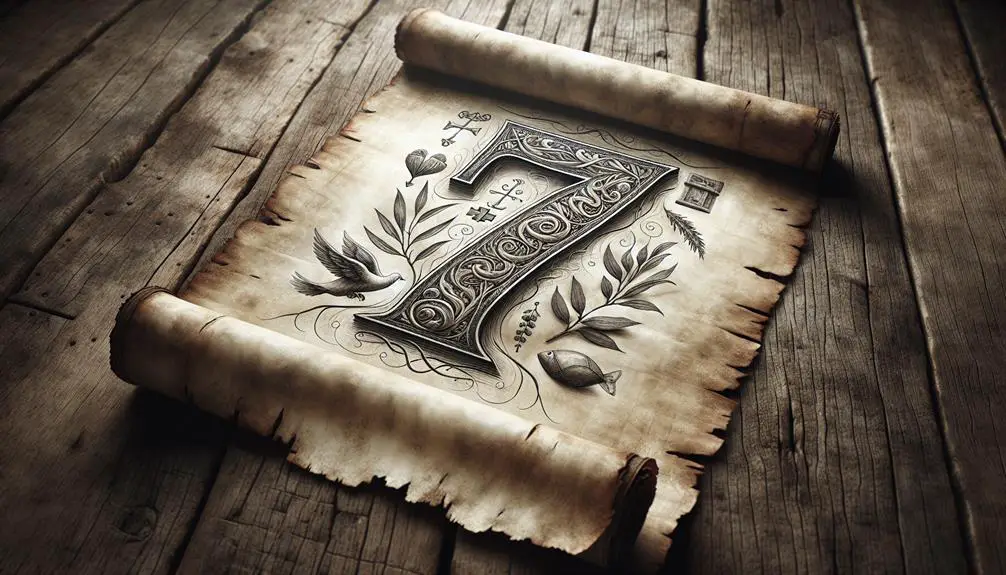
Number 8 Meaning in the Bible
Just as Noah emerged from the ark into a world reborn, the number 8 in the Bible symbolizes new beginnings and hope. You'll find its significance weaved through stories and covenants, from the timing of circumcision to the resurrection celebrated on the eighth day.
But what about the Feast of Tabernacles or the intriguing patterns of eight in biblical prophecy? There's a depth to this number that hints at a divine design, inviting you to explore its hidden meanings.
Unraveling these mysteries might just offer you a fresh perspective on life's cycles and renewals.
Key Takeaways
- The number 8 symbolizes new beginnings, renewal, and rebirth in biblical narratives.
- It represents significant transformation, divine grace, and the promise of fresh starts.
- Biblical stories like Noah's Ark and the significance of circumcision underscore the number 8's symbolism in marking new covenants and divine relationships.
- The eighth day, particularly in the context of resurrection and Easter, emphasizes redemption and the transition to a new life.
Symbolism of New Beginnings

In biblical contexts, the number 8 frequently signifies new beginnings, embodying a cyclical concept of renewal and rebirth that permeates various narratives. This symbolism is deeply woven into the fabric of scriptural texts, serving as a cornerstone for understanding the dynamics of creative renewal and the unfolding of infinite possibilities. You'll find that this number doesn't just randomly appear but is strategically placed to highlight moments of significant transformation and the dawn of new eras.
The essence of the number 8 in these ancient texts isn't merely numerical but encapsulates a profound theological insight into the nature of divine grace and the opportunity for a fresh start. It's as if the narrative structure itself is imbued with an understanding that after completion and fulfillment, represented by the number 7, there comes a moment of re-creation and re-formation. This pivotal point is where you're invited to delve into the depths of what it means to undergo a process of spiritual and moral regeneration.
The concept of creative renewal inherent in the number 8 offers a lens through which to view the endless cycle of life, death, and rebirth. It suggests that beyond the finality of an end, there's always the promise of a new beginning, ripe with infinite possibilities. This cyclical pattern reflects a fundamental belief in the resilience of the human spirit and the perpetual opportunity for renewal and transformation. In this light, the number 8 doesn't just symbolize a new beginning but embodies the eternal hope that life, in its most profound sense, is an ever-renewing journey.
The Story of Noah's Ark

As you explore the narrative of Noah's Ark, it's imperative to consider the Ark's divine construction, a testament to divine guidance and human obedience.
The global flood's impact, extending beyond mere destruction, symbolizes a profound cleansing and a fresh start for humanity.
Analyzing these elements sheds light on the biblical significance of the number eight, especially in the context of rebirth and renewal.
Ark's Divine Construction
The construction of Noah's Ark, a divine command executed with unparalleled precision, serves as a testament to obedience and faith in biblical narratives. This story not only highlights Noah's unwavering faith but also showcases the importance of woodworking precision in constructing the Ark's massive structure. It also emphasizes the role of divine guidance in maritime navigation, ensuring the Ark's safety amidst catastrophic conditions. Additionally, the meticulous planning required to house a vast array of species is highlighted, preserving biodiversity.
Analyzing the Ark's construction reveals a deeper understanding of ancient shipbuilding techniques and divine intervention. The Ark, built to withstand a global calamity, stands as a symbol of salvation and divine craftsmanship, integrating woodworking precision and maritime navigation to fulfill its divine purpose.
Global Flood Impact
Having explored the meticulous engineering and divine guidance behind the construction of Noah's Ark, we now turn our attention to the cataclysmic event it was designed to endure: the global flood and its profound impacts on humanity and the earth itself. This biblical narrative not only illustrates divine intervention but also serves as an early testament to climate change's devastating effects. Archaeological evidence has been scrutinized to understand the flood's historical and environmental implications.
Impact Aspect |
Description |
|---|---|
Environmental |
Massive climate change, reshaping landscapes. |
Societal |
Near extinction of human populations. |
Archaeological |
Evidence supporting sudden geological changes. |
Mythological |
Stories of a great flood found in many cultures. |
Ecological |
Disruption of ecosystems, leading to new evolutions. |
Circumcision and Covenant

In biblical tradition, circumcision represents not merely a physical act but a profound covenant between God and His people, signifying a commitment that transcends generations. This ritual, deeply embedded within Abrahamic traditions, carries a weight of symbolic and spiritual meaning far beyond its physical manifestation. Its origins trace back to Abraham, marking a perpetual bond between God and the descendants of Abraham, Isaac, and Jacob. The ritual significance of circumcision is multifaceted, serving as a tangible sign of faithfulness and obedience to God's commands.
Understanding the complexity of circumcision within this context requires examining its key aspects:
- Symbol of the Covenant: Circumcision acts as a physical sign of the covenant between God and Abraham's descendants, a promise of multiplication and blessing.
- Rite of Passage: It signifies an individual's entry into the community of faith, marking a spiritual rebirth and dedication to God.
- Test of Faith: The act of circumcision, especially when adopted by adult converts, stands as a profound test of faith and commitment to God's will.
This covenantal act, therefore, isn't just a ritual but a foundational element of identity for the people within these traditions. It serves as a constant reminder of their special relationship with God, a bond that demands both recognition and responsibility. The practice of circumcision, thus, encapsulates the enduring nature of divine promises and human response, highlighting the depth of commitment required to maintain this sacred relationship.
Resurrection on the Eighth Day
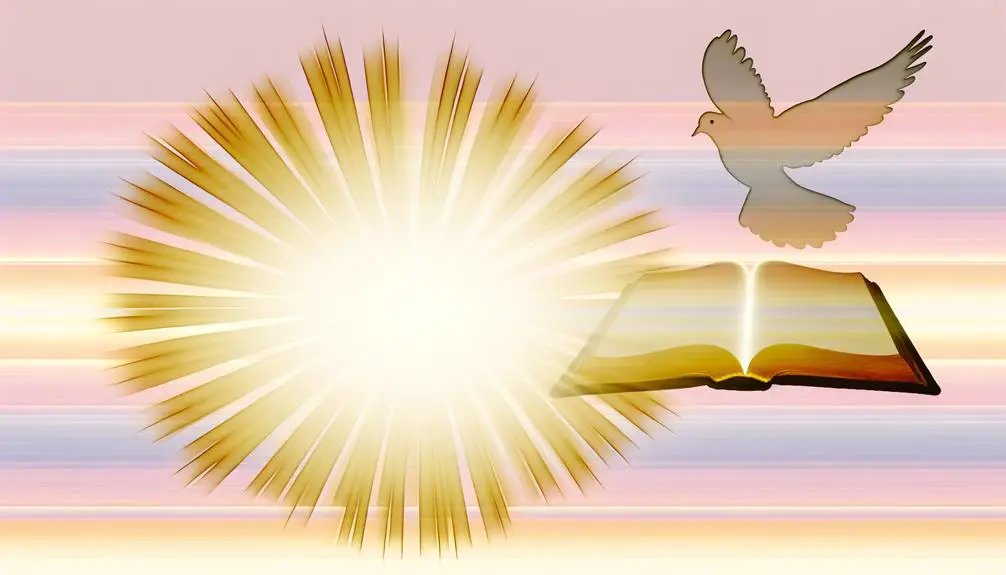
You'll find that the concept of resurrection on the eighth day holds profound theological depth within biblical narratives, particularly in its association with Jesus' resurrection timing.
This event not only underscores the eighth day's symbolism as a marker of new beginnings and eternal life but also intricately connects to the larger biblical motif of redemption and renewal.
Analyzing this symbolism reveals layers of meaning about divine order and the promise of a new creation in Christian theology.
Eighth Day Symbolism
The concept of resurrection on the eighth day carries deep symbolic resonance within biblical texts, representing a new beginning and the transcendence of natural order. In the context of Levitical rituals, the number eight signifies a moment of transformation—where the mundane transcends into the sacred. Similarly, the Sabbath rest, observed on the seventh day, sets the stage for the eighth day's significance as a marker of new creation and eternal life.
- Levitical rituals: Introduce a period of purification, culminating in a new beginning on the eighth day.
- Sabbath rest: Symbolizes completion and perfection, setting a foundation for a new work that begins on the eighth day.
- New beginning: The eighth day represents a fresh start, free from the constraints of the previous order.
Jesus' Resurrection Timing
Building on the profound symbolism of the eighth day, Jesus' resurrection occurs precisely at this pivotal moment, underscoring its significance as the ultimate manifestation of new beginnings and eternal life. This event intricately aligns with the Easter chronology, establishing a direct link with the Passover significance, which celebrates deliverance and rebirth.
Aspect |
Importance |
|---|---|
Easter Chronology |
Marks the fulfillment of prophecies. |
Passover Significance |
Symbolizes liberation, foreshadowing Jesus' resurrection. |
Analyzing the resurrection on the eighth day, you'll find a deliberate intertwining of Jewish tradition and Christian belief, emphasizing a continuation yet divergence towards a new covenant. This timing isn't coincidental but a theological statement, deeply rooted in biblical history, highlighting the transition from old to new, from bondage to freedom, encapsulated in Jesus' rising on the eighth day.
New Beginnings Significance
Marking a pivotal moment in Christian theology, Jesus' resurrection on the eighth day encapsulates the profound significance of new beginnings, heralding an era of eternal life and redemption. This event is deeply intertwined with the broader biblical narrative, symbolizing a continuation and fulfillment of God's salvific plan as outlined in the Creation story and the Exodus journey.
Consider these aspects:
- *The eighth day marks a departure from the cyclical nature of the world, introducing the concept of an eternal new beginning.*
- *It connects the resurrection with the Creation story, where God's work culminates in a day outside the initial week, symbolizing a new creation.*
- *The Exodus journey, representing liberation and a journey towards the Promised Land, parallels the transformative journey from death to eternal life.*
The Feast of Tabernacles
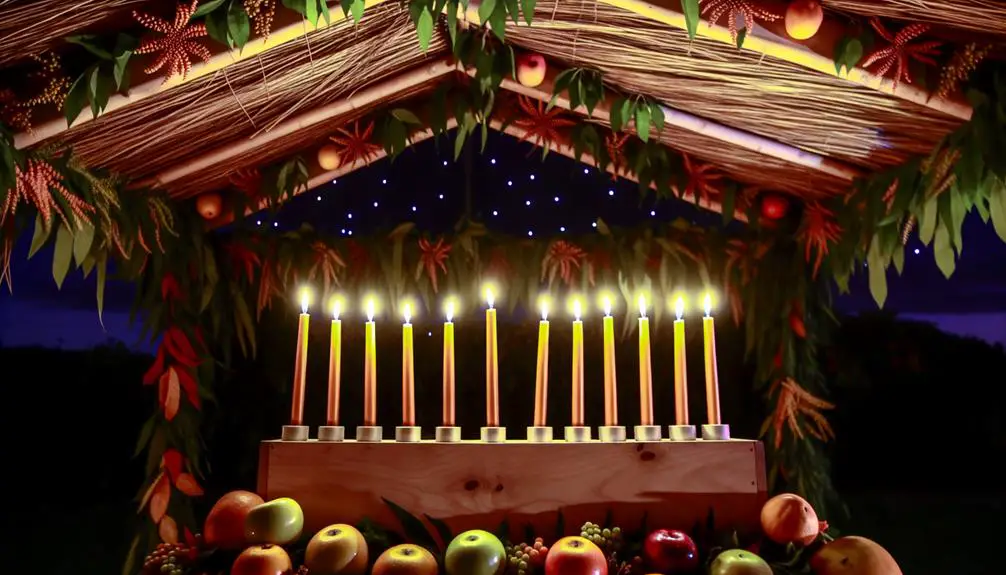
In biblical tradition, the Feast of Tabernacles holds significant importance as it commemorates the Israelites' forty-year journey in the wilderness, living in temporary shelters. Known in Hebrew as Sukkot, this feast not only reflects on their past hardships and reliance on God but also celebrates the agricultural significance of the harvest season. Sukkot traditions, deeply embedded within Jewish culture, encompass dwelling in sukkahs—temporary booths made of branches and leaves—mirroring the fragile dwellings of their ancestors. This act serves as a vivid reminder of the impermanence of material life and the need to seek spiritual sustenance.
The agricultural significance of Sukkot can't be overstated. It marks the end of the harvest season, a time when the Israelites would gather the fruits of their labor. This period of joy and thanksgiving to God for the bounty of the land underscores the theme of reliance on divine providence. The use of the lulav and etrog, symbols of the harvest, in ritual practices during Sukkot, further accentuates this connection between the celebration and its agricultural roots.
Analyzing Sukkot through a scholarly lens reveals its layered meanings. Beyond commemorating historical events, it encapsulates themes of dependence, gratitude, and renewal. The sukkah itself, a temporary structure, symbolizes both the fragility of life and the resilience of faith. As you delve into the traditions and significance of Sukkot, you're invited to reflect on the broader themes of human vulnerability and the sustenance derived from faith and community. Through this lens, Sukkot transcends its historical and agricultural origins, offering profound insights into the human condition.
Patterns of Eight in Prophecy
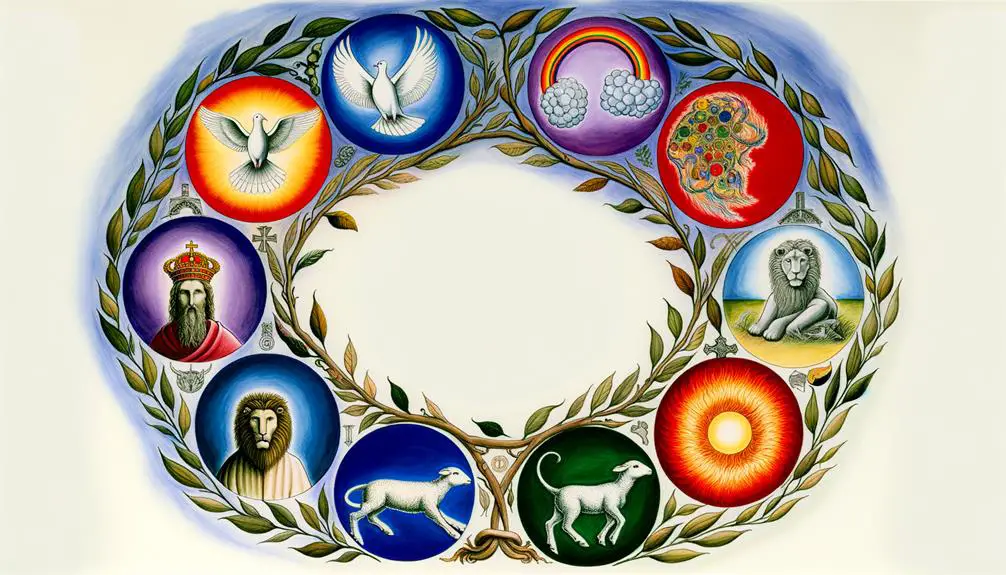
Reflecting on the Feast of Tabernacles reveals a deep-seated tradition of commemoration and reliance, a theme that resonates strongly when exploring the patterns of eight in prophecy. The biblical numerology around the number eight is rich with meaning, often symbolizing a new beginning or resurrection. Within the prophetic texts, this symbolism is deeply woven into the narrative structure and thematic elements, revealing profound insights into divine messages and eschatological promises.
Diving into the patterns of eight, you'll find:
- The Eight Beatitudes: Presented in the Sermon on the Mount, these blessings outline a path to spiritual prosperity and moral righteousness. They serve as a foundational element in Christian ethics, each beatitude a facet of the new covenant, embodying the kingdom of heaven's principles. The number eight here signifies a rebirth of spirit and character, a transition from old to new covenantal relationships with God.
- The Eight Kings: In prophetic scriptures, the enumeration of kings often carries significant weight. The mention of eight kings, for instance, can symbolize a cycle of judgment and renewal, encapsulating the notion of divine governance and the eventual establishment of God's eternal kingdom. This pattern underscores the biblical theme of God's sovereignty and the fulfillment of His promises through a new beginning marked by the reign of these kings.
- The Resurrection on the Eighth Day: Symbolizing a new creation and eternal life, the resurrection event ties directly into the concept of eight as a number of new beginnings and eternal salvation.
These patterns underscore the intricate tapestry of biblical prophecy, where the number eight emerges as a symbol of hope, renewal, and divine fulfillment.
Frequently Asked Questions
How Does the Number 8 Relate to the Concept of Balance and Justice in Biblical Texts Outside of the Traditional Narratives and Ceremonies?
You'll find that the number 8 connects deeply with balance and justice in biblical texts, beyond traditional stories and rituals.
Specifically, the Eight Beatitudes present a vision of moral and spiritual equilibrium, advocating for virtues that lead to righteousness.
Similarly, Solomon's Temple, with its eight-sided structure, symbolizes a space of divine justice and presence.
These examples underscore how the concept of eight weaves through biblical narratives, enriching themes of balance and justice.
Can the Significance of Number 8 in the Bible Be Linked to Any Specific Psalms or Proverbs That Do Not Directly Mention the Number, but Embody Its Symbolic Meaning?
You're exploring how Psalm analysis and Proverbial wisdom might echo the significance of the number 8, without directly mentioning it. This involves delving into texts that exemplify themes of renewal, balance, and justice, akin to the symbolic essence of 8.
Are There Examples of Biblical Figures or Events Associated With the Number 8 That Are Not Directly Related to the Topics of New Beginnings, Covenants, or Prophetic Patterns?
You're exploring biblical figures and events linked to the number 8, excluding themes like new beginnings, covenants, or prophetic patterns.
Consider the circumcision ritual, performed on the eighth day of a male infant's life, symbolizing a covenant with God.
Also, the intricate details of the priestly garments, which, while not directly associated with the number 8, reflect a deep dedication and sanctity in service, akin to the number's symbolic significance.
How Has the Interpretation of the Number 8's Meaning in the Bible Evolved in Christian Theology Outside of the Contexts of Resurrection, Tabernacles, and Noah's Ark?
You've noticed that the interpretation of the number 8 has grown in Christian theology to encompass themes beyond traditional narratives.
Circumcision significance, originally highlighting a covenant with God, has been reexamined for its deeper spiritual implications.
Similarly, musical notations, tied to the structure of ancient hymns, reflect an evolving understanding of divine harmony.
These shifts illustrate a broader theological exploration, moving beyond literal interpretations to uncover more nuanced spiritual meanings.
In What Ways Do Non-Canonical Texts or Apocryphal Writings Within the Judeo-Christian Tradition Incorporate or Reflect on the Symbolism of the Number 8?
You're diving into a sea of ancient texts, where the symbolism of the number 8 whispers secrets beyond the surface.
In non-canonical writings, this numeral often mirrors an eightfold path to wisdom or enlightenment, subtly guiding seekers.
The circumcision debate in early Christianity also reflects its importance, suggesting a spiritual rebirth or new beginning.
This deep dive reveals how apocryphal texts weave the number 8 into their fabric, offering layers of meaning for you to uncover.
Conclusion
In conclusion, the number 8 weaves a tapestry of renewal and covenant throughout the biblical narrative. From Noah's Ark heralding a fresh start, to the intimate sign of circumcision, and the profound significance of resurrection on the eighth day, this number is a cornerstone of divine promise.
The Feast of Tabernacles and prophetic patterns further underscore its importance. Like the phoenix rising from ashes, the biblical symbolism of 8 invites us to see beyond mere numbers, revealing a deeper story of redemption and hope.

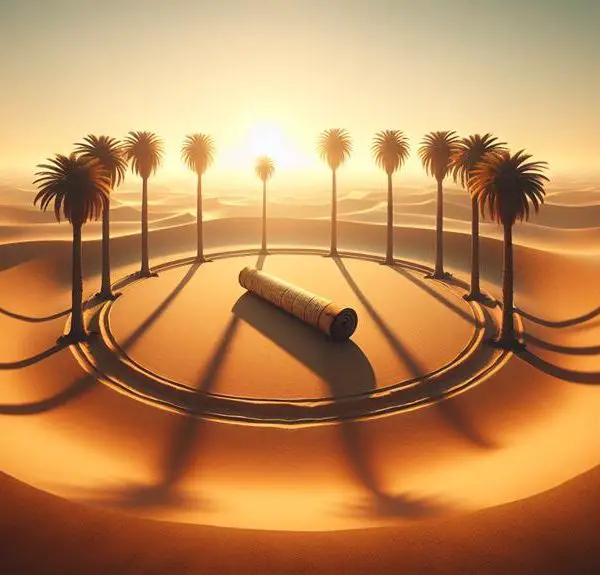
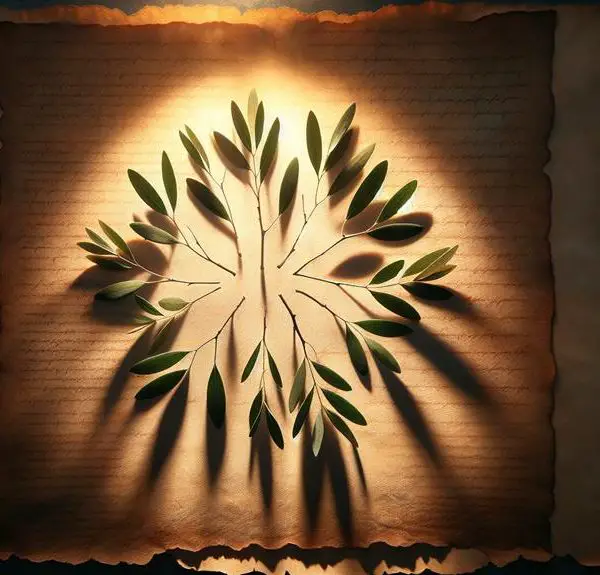
Sign up